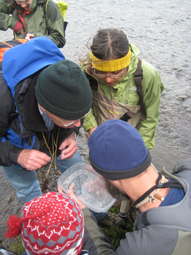May 30, 2008 - June 15, 2008
Tracing Darwin's Path
"Field Course in Sub-Antarctic Conservation: Integrating the Human Dimension to Biocultural Conservation at the Southern End of the Americas"
 Course Instructors:
Course Instructors:
Dr. Christopher Anderson, Institute of Ecology and Biodiversity, Chile
Dr. J. Britt Holbrook, Department of Philosophy and Religion Studies,
University of North Texas
Dr. Robert Frodeman, Dept. of Philosophy and Religion Studies, UNT, USA
Dr. James Kennedy, Dept of Biological Sciences, UNT, USA
Dr. Andrés Mansilla, University of Magellanes, Chile
Dr. Ricardo Rozzi, Dept of Philosophy and Religion Studies, UNT, USA
The course is interdisciplinary and international in nature, as students from the University of North Texas come from many disciplines (Anthropology, Journalism, Biology, Philosophy, Art) and we have Chilean students from the University of Magallanes. While students will be involved with both the biological and cultural elements of the program, students can choose to focus on the biological or philosophical components depending on which class they enroll.
Please inquire to philosophy@unt.edu with the subject line "Chile 2008 Summer Course" if you are interested in the course.
Course Number:
PHIL 4960 Proseminar in Philosophy
BIOL 4005 Topics in Biology
Program Components:
The course will use the Omora Park as a case study to demonstrate the integration of society and science, via the creation of an ecology, policy and philosophy LSTER at the Cape Horn Biosphere Reserve.
Specific programs and topics:
Global change - a holistic approach to address social and biological change
- Contemporary conservation policy
- UNESCO's Man and the Biosphere Program
- Exotic and invasive species
- Ozone hole - UVB
- Endangered cultural diversity
LSTERs - moving beyond just monitoring and achieving social integration
- Terrestrial-marine linkages
- "Hidden" biodiversity
- Ecosystem restoration
Specific goals are:
1) Observing, describing and investigating some of the less conspicuous groups of animals and plants ("hidden" biodiversity): aquatic invertebrates, and non-vascular plants (bryophytes). This focus involves biological and philosophical questions.
2) Contrasting our observations with Darwin's records made 170 years ago at the southern end of the Americas.
3) Comparing scientific and indigenous natural history views and practices of contemporary scientific understanding about ecology.
Course Description:
The course will provide students with an interdisciplinary research, conservation and education experience at one of the most pristine wilderness areas remaining in the world. The course theme will be the UNESCO Man and the Biosphere (MaB) Programs approach to conservation - linking people and development with biodiversity and ecosystems. It will be taught in partnership with a graduate-level class in conservation at the University of Magallanes (UMAG), Chile (UNT has MOU with UMAG).
The class will spend time both in Punta Arenas, the regional capital, and Puerto Williams, the world's southernmost town. To arrive to Puerto Williams, we will take a 1.5 day ferry through the channels and fjords of the Cape Horn Biosphere Reserve.
The class time and field work will expose students to both the practical and theoretical aspects of biocultural conservation, including a workshop with the regional government and the Scientific Advisory Committee of the Cape Horn Biosphere Reserve.

